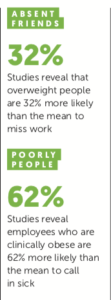Leaders must be physically fit to lead so their employees follow them, writes Kate Cook
Obesity kills your business. It is a clear and present danger on both sides of the Atlantic. A study of 15,000 people in the US and UK found that overweight people were 15% less productive than their healthy colleagues. This productivity deficit is grave: studies show that the US economy is losing $43 billion a year because of the obesity crisis.
As a leader, you likely know this. You are probably already aware that the physical health of your employees – or lack of it – comes with high commercial and social costs.
You know the conventional countermeasures. You may have installed a wellness programme. You have probably already hired consultants to help encourage your staff up from their desks by way of digital detox. You might even have introduced lunchtime yoga.
None of these are enough. My work with businesses over two decades reveals that unless healthy nutrition and healthy lifestyles are built into the DNA of every organization – and championed from the very top – most programmes are doomed to failure.
Too often, balanced diets and active lifestyles are seen as a ‘nice to have’. They are typically allocated to the HR department as part of its responsibility to develop benefits and perks for employees. What they should be is fundamental to the strategic plan for the company.

Thus, outcomes must be absorbed into the mindset of leadership. Frequently, they amount to little more than a few ‘lunch and learns’ for which the engaged people who don’t need them turn up, and the very people for whom they could be a lifeline remain glued to their desk – anxious about the impact on their workload, having been given neither space nor express permission to step away from their burgeoning email pile. If they take an hour off for lunch to listen passively – they fear they will simply pay for it later on by lingering even longer at their workstation.
None of this is to say that lunch and learn sessions cannot be useful or good. But where is the strategic plan, and where and how is the benefit to the company actually measured? It is on these two key questions that leaders have a huge role to play.
It is true that the pinnacle of an organization is a lonely place. It is easy to think, from your isolated standpoint, that the wellbeing of an organization is for ‘them’, not you. You power through stuff. You are paid to bear stress, right? Wrong. As a leader, you must live and breathe wellbeing. Only by leading by example will it be possible to inspire your employees to adopt healthy lifestyles.
Enjoying a nutritious balanced diet should be a core responsibility to the business. It is a leader’s role to project that responsibility onto everyone in the organization by living it themselves. If the enthusiasm for wellbeing – both for mental and physical health – of your staff doesn’t begin with you, and the message doesn’t run all the way through the company, wellness initiatives are always just a box-ticking exercise.
Your talent. That’s what you call the people who work for you. If you are a leader, you spearhead your tribe; you want to do everything that you can to look after the people who come through your company’s doors every day. That way your organization retains those clever, talented people. If you have engaged, alert and energetic staff, you can fend off competition, make more profit and win the day.
Faking it as a leader is worryingly common. I have seen plenty of leaders struggle through meetings then having to snooze in the car park or literally under the desk. It is common for those in command to have just four to six hours sleep a night.
The work of Professor Matthew Walker blows out of the water the idea that sleep is something we can do when we are dead. In fact, we might be dead sooner than we planned if we don’t heed him, since his evidence shows the damaging effect sleep deprivation has on the mind, body and immune system.
There is a better way, but it starts with you. Bringing wellbeing into the DNA of your company is a key part of your role. How you plan to live a fulfilled, happy and healthful life permeates the place you lead. It will pay dividends on the engagement and happiness of your most precious asset – your workforce – and, thus, your business.

